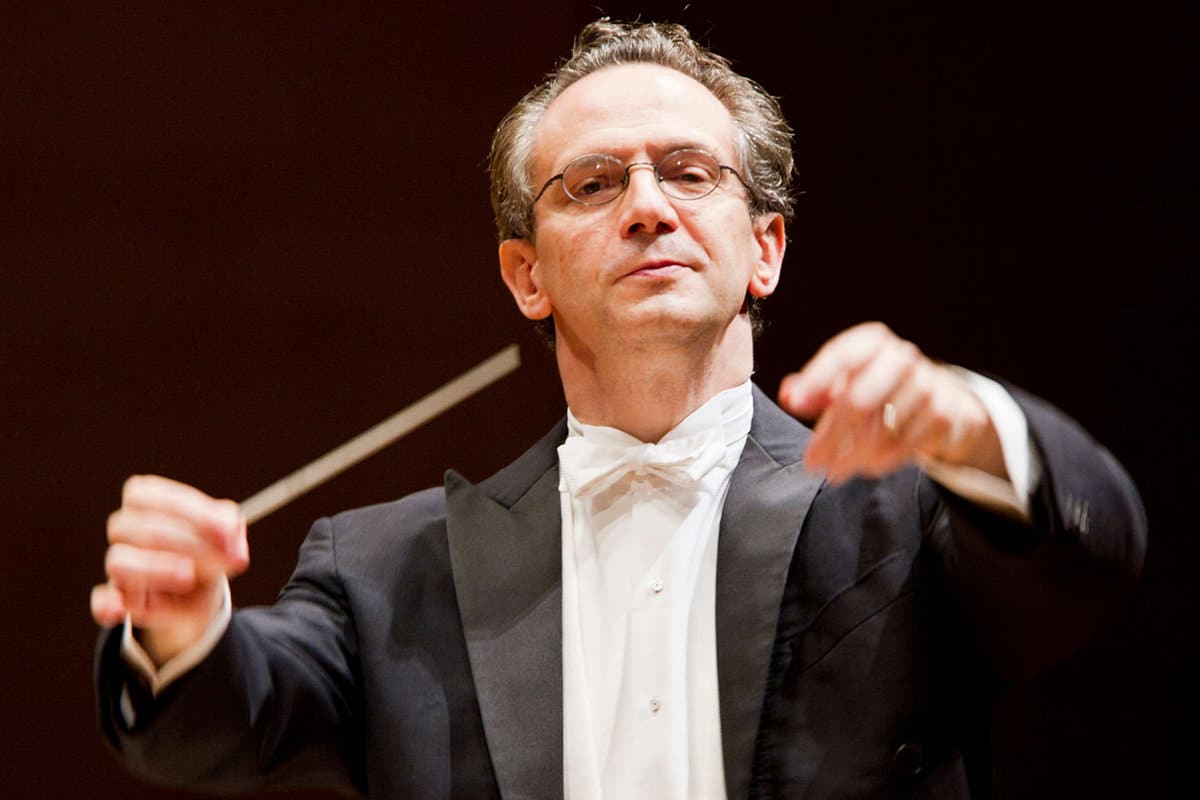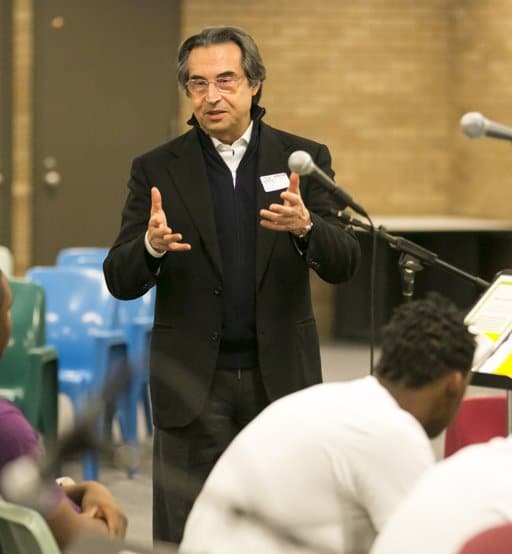We’re hearing there will be no second-round interviews for head of Radio 3. A decision has been made. Candidates have not yet been notified.
The winner is, in all likelihood, the least impressive , accomplished and in broadcasting terms least qualified of the candidates interviewed.
Requiems to the ready.

Nielsen Soundscan puts the venerable Leon Fleisher on top of its classical charts this week, with 358 sales of his birthday album on Bridge Records.
Second is Elina Garanca (DG), third Leif-Ove Andsnes (Sony), fourth Joyce DiDonato (Warner).
Must be the first time in a distinguished and turbulent career that Fleisher has released a number one.

We have received these reflections from the music director of Zurich Opera on the changes that are taking place in his profession, as outlined earlier today on Slipped Disc.

Dear Norman,
I don’t think that Maestros (sic!) have gone mad.
But like any other artist, and probably more than other artists, they are looking for serenity and stability.
From my personal experience (I have been music director of five orchestras and two opera houses – in one of them, the Zurich Opera, I still am) I can say that the role of a music director is a delicate one, unique in the music business, trying to balance artistic ambition (not necessarily personal ambition, but ambition for the institution) and contingency.
Accepting this function is always a challenge and the primary objective should be a perspective for the institution itself. What can I do in order to artistically develop the institution, giving new impulses, strengthening the role of the orchestra in my (our) artistic concept, opening to new ideas. This can only be achieved in a teamwork. The projection of the music director alone can provide musical “high points” – which can be wonderful, as in Dresden with Thielemann right now, but without a strong and like-minded team you will not achieve any of those goals.
If you are faced with the impossibility to have perspectives, for many of us the job becomes frustrating: the problems of contingency become overwhelming and eventually we would miss the serenity (as Maestro Muti points out with sincere simplicity) to do our job well.

The situation in Italy is right now far from serene: all musical institutions (except perhaps La Scala and Santa Cecilia) have heavy structural and financial problems, orchestras and choruses are stuck in a 1970s-forma mentis, not only in terms of work rules, but in terms of flexibility and openness to new ideas. General managers are often not well prepared to face this situation, although many of them try very hard and honestly to convince everybody of the necessity to change direction.
I don’t blame Maestros Muti, Noseda and Luisotti for their decision, at the contrary, I can sense and understand their sadness and frustration (although I don’t know the background of Luisotti’s resignation): the balance between own work and contingency was broken, and contingency was not acceptable anymore.
What we want is to make music and to enable our theater or our orchestra to shine. We help to develop ideas and we can mediate between orchestras and management if there are problems (or, let’s say, we should do this – not all music directors do that in times of trouble; I always did it in Lepizig, Geneva, Dresden and Vienna), but we also need good conditions of work, clear artistic direction, which we only can have if the team around us works properly. I am very fortunate to be part of a fantastic, ideal team in Zurich and an orchestra which is musically involved during rehearsals and concerts.
If we don’t get this, we’d better go.
Best regards

Fabio
In the second of his lockout logs, bass player and composer Michael Kurth describes life in a section where three (of eight) seats are vacant and two more are falling soon.
The cost of flying in replacements is exorbitant.
This is what the Atlanta Symphony Orchestra calls good management.
Read Michael here.

Now how dumb is that?
The Daily Mirror has just made a handsome payout to Alan Yentob for hacking his phone.
Yentob, a corporate survivor, has not consciously taken a decision in decades and knows hardly anyone worth knowing.
Hacking his phone must be like listening to paint dry.


Netrebko’s cost more. Renee has people who tell her the time.
Five music directors have walked off the job in as many weeks, three of them in Italy*.
Ah, Italy, you say.
True. A special case.
But the cause in four of the five cases is the same: a clash of general director and music director in which there could only be one winner.
What’s unusual is that when human relations become intolerable maestros usually give two or three years notice of resignation. Now, for the first time, if they don’t like the temperature, they walk off the job.
Good for music? Perhaps.

Conductors the world over feel isolated and sometimes besieged within their institutions. Agents, who are supposed to keep them informed and look after their interests, are under pressure to produce new talent and offer insufficient backup to keep their existing maestros purring and well informed. General directors are busy, harassed, under constant threat of cuts. Musicians are fearful for their jobs. The media are indifferent, unaware of the importance of the role.
The title of music director has become thankless and unappreciated. When push comes to shove, the instinct is now to jump.
We are witnessing a redefinition of powers between conductors and the establishments they serve.
Riccardo Chailly will enter La Scala next month conditionally – as principal conductor for a year to see if he can achieve the results he wants before he decides whether to upgrade to music director.
There is no rush to apply for such important vacancies as the Concertgebouw and the Berlin Philharmonic.
Expect two, perhaps three more resignations in Italy over the coming, cutting months.
Some orchestras are settling for workaday and second-best, a reliable conductor who won’t walk out.
The music director’s job has lost its glory. Conductors are going back to the drawing board.
*Noseda (Turin), Muti (Rome), Luisotti (Naples).
The culture minister will tell Parliament today that institutions in the Flemish region must cut back, starting now.

The one where he busked on a $3m Strad in 2007 and the commuter world just walked by.
This time, he has announced it in advance.
He made $32 and a few cents in tips on the original gig. Times must be tough.

Hitler didn’t or he’d have rode a different car.

The original Mercedes Jellinek, for whom the car was named in 1901, was the daughter of Emil Jellinek, entrepreneurial owner of Daimler Motors.
Mercedes married twice into the ruined Austrian aristocracy and died of cancer in 1929, aged 39.
Her paternal grandfather, Adolf Jellinek, was rabbi of Vienna’s Leopoldstadt synagogue, moving to the Seitenstetten synagogue in 1865, where he was considered to be the city’s unofficial chief rabbi. He was known to Freud, Schnitzler, Herzl and Gustav Mahler.
So Hitler rode a Jewish car. Who knew?

Read more about Mercedes Jellinek here.
In case you haven’t discovered it, there’s a Passenger Shaming page on Facebook where you can get your own back on sub-humans who behave disgracefully beside you after takeoff.
Take a look, and tell the person next to you to put those bare feet down or he/she will be framed.
The site, started by a disgruntled air steward, is going viral. Check this CNN report.



And they say musical instruments are a problem on board aircraft.
It has been a tough decade for the Berlin Philharmonic, losing one media stronghold after the next.
First Deutsche Grammophon stopped recording them when sales no longer covered the BPO’s high fees. Then other labels pulled out. The recent invention of an own-label struck the market as an act of desperation and the orch’s streaming ventures are not fulfilling early dreams.
So the orch has now gone abroad and formed a partnership with WQXR, the public radio station in New York, which is funded by donations and pays negligible contributor fees. It’s a bold, non-profit move by Berlin, an attempt to groom an audience in a city with only one symphony orchestra (Berlin has five or six) and rebuild a faltering brand.
But will it work? Press release below.

(New York, NY—September 23, 2014) – This fall, the Berlin Philharmonic will partner with a US media company for the first time when it joins with WQXR, New York City’s classical music station, to present a robust roster of recorded concerts never before broadcast in the US.
Beginning on Tuesday, October 7, WQXR presents “The Berlin Philharmonic in Concert”, a two hour radio show featuring music recorded live at the Philharmonie in Berlin. This exclusive 12-part series, airing on consecutive Tuesdays at 9pm ET, allows listeners a rare chance to hear the Berlin Philharmonic on its home turf. Hosted by WQXR’s Annie Bergen, each broadcast includes a complete concert, drawn principally from the current 2014-2015 season. The never-before-available broadcasts will be available for on-demand streaming for one week on WQXR.org.
The schedule is as follows:
- October 7: Schumann Symphony No. 1 & Brahms Symphony No. 1
- October 14: Mozart Piano Concerto in B-flat major, K. 456; Messiaen Oiseaux exotiques; Haydn, Selections from his symphonies,The Creation and Seven Last Words (featuring soloist Mitsuko Uchida)
- October 21: Ives The Unanswered Question; Strauss Metamorphosen; Brahms Piano Concerto No. 1 (featuring soloist Daniel Barenboim)
- October 28: Schumann Symphony No. 2 & Brahms Symphony No. 2
- November 4: Bach St. Matthew Passion
- November 11: Strauss Burleske & Also Sprach Zarathustra; Mozart Piano Concerto in E-flat major K. 449 (soloist Emanuel Ax; guest conductor Andris Nelsons)
- November 18: Bach St. John Passion
- November 25: Beethoven Symphony No. 9 in D-minor “Choral” & Szymanowski Stabat Mater
- December 2: Schumann Symphony No. 3 & Brahms Symphony No. 3
- December 9: Bach Cantata No. 58; Mendelssohn Symphony No. 3; Nielsen Symphony No. 3 (guest conductor Alan Gilbert)
- December 16: Mendelssohn Ruy Blas Overture; Schumann Piano Concerto in A minor; Rachmaninov Symphony No. 3 (soloist Martha Argerich; guest conductor Riccardo Chailly)
- December 23: Schumann Symphony No. 4 & Brahms Symphony No. 4
To celebrate this unprecedented partnership, WQXR will host a live performance by the orchestra’s The Varian Fry String Quartet on Tuesday, September 30 at 7pmin the station’s intimate event venue, The Jerome L. Greene Performance Space. WQXR’s Jeff Spurgeon hosts an evening that includes a sampling of the orchestra’s recent CD and DVD releases of music of Schumann and Bach, as well as the quartet performing music of Haydn and Schubert. Tickets are available atwww.thegreenespace.org.
In addition, WQXR will live broadcast the Berlin Philharmonic’s season opening concert at Carnegie Hall on Wednesday, October 1 to kick off this season’s Carnegie Hall Live series.
















